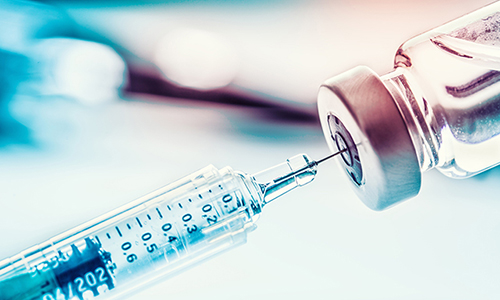The COVID-19 Vaccine and Pregnancy: What You Need to Know
Featured Experts:
COVID-19 vaccines are available to patients and the public, and with that come many questions regarding administration of the vaccines for people who are pregnant and lactating. Andrew Satin, M.D., director of gynecology and obstetrics at Johns Hopkins, and Jeanne Sheffield, M.D., director of maternal-fetal medicine, provide information on this topic.
Is the COVID-19 vaccine available for people who are pregnant?
Yes. COVID-19 vaccines currently authorized by the Food and Drug Administration (FDA) and Centers for Disease Control and Prevention (CDC) are recommended for pregnant and lactating people as well as those trying or intending to become pregnant. We strongly recommend that people with remaining concerns talk with their doctor to discuss all factors about the vaccine and their pregnancy. The recommendation is based on the following:
- Symptomatic pregnant people who contract COVID-19 are at more risk of severe illness, complications and death than people who are not pregnant. Many people who are pregnant have other medical conditions that put them at further risk.
- COVID-19, particularly the omicron strain, remains a threat many communities.
- Over 200,000 people who are pregnant have received COVID-19 vaccines (Pfizer, Moderna or Johnson & Johnson’s Janssen) without any safety concerns. Vaccine safety has been well studied in multiple national and international studies.
- Data from the CDC indicate that completion of the 2-dose mRNA vaccines (either Pfizer or Moderna) during pregnancy may help prevent COVID-19 hospitalization among infants 6 months or younger.
Why is it important for people who are pregnant to get vaccinated?
Data strongly indicates that the benefits of getting a COVID-19 vaccine far outweigh risks for people who are pregnant or might become pregnant. The CDC states:
Although the overall risks are low, people who are pregnant or recently pregnant are at an increased risk for severe illness from COVID-19 compared with people who are not pregnant. Severe illness includes illness that requires hospitalization, intensive care, need for a ventilator or special equipment to breathe, or illness that results in death. Additionally, people who have COVID-19 during pregnancy are at increased risk of preterm birth and stillbirth and might be at increased risk of other pregnancy complications.
Should people who are pregnant and/or lactating receive the COVID-19 vaccine?
Yes. Johns Hopkins Medicine agrees with and strongly supports the recommendations of the CDC and its Advisory Committee on Immunization Practices, the American College of Obstetricians and Gynecologists (ACOG) and the Society for Maternal-Fetal Medicine (SMFM), which say that all people who are pregnant and/or lactating, along with those trying to become pregnant, should be vaccinated against COVID-19.
The CDC includes people who are pregnant among groups at high risk for severe COVID-19 illness. The decision to receive the COVID-19 vaccine should be a shared decision among the person who is pregnant, the care partner(s) and medical provider(s).
COVID-19 Vaccine Guidelines for People Who Are Pregnant or Breast-feeding
- The CDC, ACOG and SMFM say FDA- authorized COVID-19 vaccines should be recommended to people who are pregnant and/or lactating.
- For those with ongoing concerns, a conversation between the patient and the clinical team may help with decisions regarding use of vaccines.
- The World Health Organization says it does not have any reason to believe there will be specific risks that would outweigh the benefits of vaccination for people who are pregnant. Those at high risk of exposure to SARS-CoV-2 (for example, health care workers) or who have comorbidities (health conditions that may contribute to death) that add to their risk of severe disease may be vaccinated in consultation with their health care provider.
- You can review recommendations here:
Can I get the COVID-19 vaccine if I am breast-feeding?
Yes. It is now recommended by the ACOG, the SMFM and Johns Hopkins Medicine obstetrics leaders. Based on available data, it appears safe to receive the COVID-19 vaccine if you are nursing a baby. Although the vaccines were not initially studied in nursing mothers, review of the evidence by the ACOG, SMFM and CDC revealed no adverse safety issues among people and their babies. The vaccines do not contain live virus, so being vaccinated does not pose a risk to the baby. If you are vaccinated for COVID-19, there is no need to delay or discontinue breast-feeding.
Will the COVID-19 vaccine affect my fertility?
No. Receiving the COVID-19 vaccine will not affect your fertility. People actively trying to conceive may get the current COVID-19 vaccines — there is no reason to delay pregnancy after completing the vaccine series. The American Society for Reproductive Medicine reports that there are no fertility-related reasons to not receive a vaccine.
Confusion regarding this issue arose when a false report surfaced on social media, saying that the spike protein on the coronavirus that causes COVID-19 is the same as another spike protein, syncytin-1, that is involved in the growth and attachment of the placenta during pregnancy. The false report said that getting the COVID-19 vaccine would cause the body to fight this spike protein and affect fertility. The two spike proteins are completely different, and receiving the COVID-19 vaccine will not affect the fertility of people who want to become pregnant, including through in vitro fertilization methods. During Pfizer vaccine tests, 23 women volunteers in the study became pregnant, and the only one in the trial who had a pregnancy loss did not receive the vaccine — she got a placebo.
Does the COVID-19 vaccine affect the immune system of a person who is pregnant?
The vaccine activates the immune system to help the patient fight the viral infection.
Some expectant mothers have voiced concerns about the risk of miscarriage after being vaccinated. What can you tell us about that?
Results from published studies suggest there is no increased risk of first trimester pregnancy loss for patients who receive any of the three vaccines that currently have emergency use authorization: Pfizer, Moderna and Johnson & Johnson-Janssen.
What effects does the vaccine have on me and my child while breast-feeding?
The data regarding breast-feeding are limited, but some case reports suggest that people who are lactating and who receive the vaccine will pass protective antibodies in the breast milk to their babies. It’s important to remember that the vaccines do not contain live virus, so there isn’t an infection risk to the baby. You should not delay or discontinue breast-feeding after getting the vaccine.
Can I get COVID-19 from the vaccine?
No. You cannot get COVID-19 from the currently available vaccines. You may experience mild, temporary side effects, but this is an indication of the immune response to the vaccination, not COVID-19.
Learn more about COVID-19 vaccines, their safety and side effects, and what to expect if you choose to be vaccinated.
Can COVID-19 be severe for people who are pregnant?
Yes. The Centers for Disease Control and Prevention includes people who are pregnant among high-risk groups for severe COVID-19 illness. Getting vaccinated for COVID-19 is an important consideration for people who are pregnant.
- Recent data reports an increased risk of intensive care unit admission, need for mechanical ventilation and ventilator support, and death for people who are pregnant and who have symptomatic COVID-19.
- Comorbidities (health conditions that may contribute to death) as well as several racial and socioeconomic factors increase the risk of severe COVID-19.
- People who are lactating are not considered at higher risk of developing severe illness than the nonpregnant population.
Are boosters recommended for people who are pregnant?
ACOG recommends that people who are pregnant or who were recently pregnant (up to six weeks postpartum) receive a booster dose after completing their initial COVID-19 vaccine or vaccine series.
As always, be sure to talk to your obstetrician about care considerations that are specific to you.
COVID-19 Vaccine








